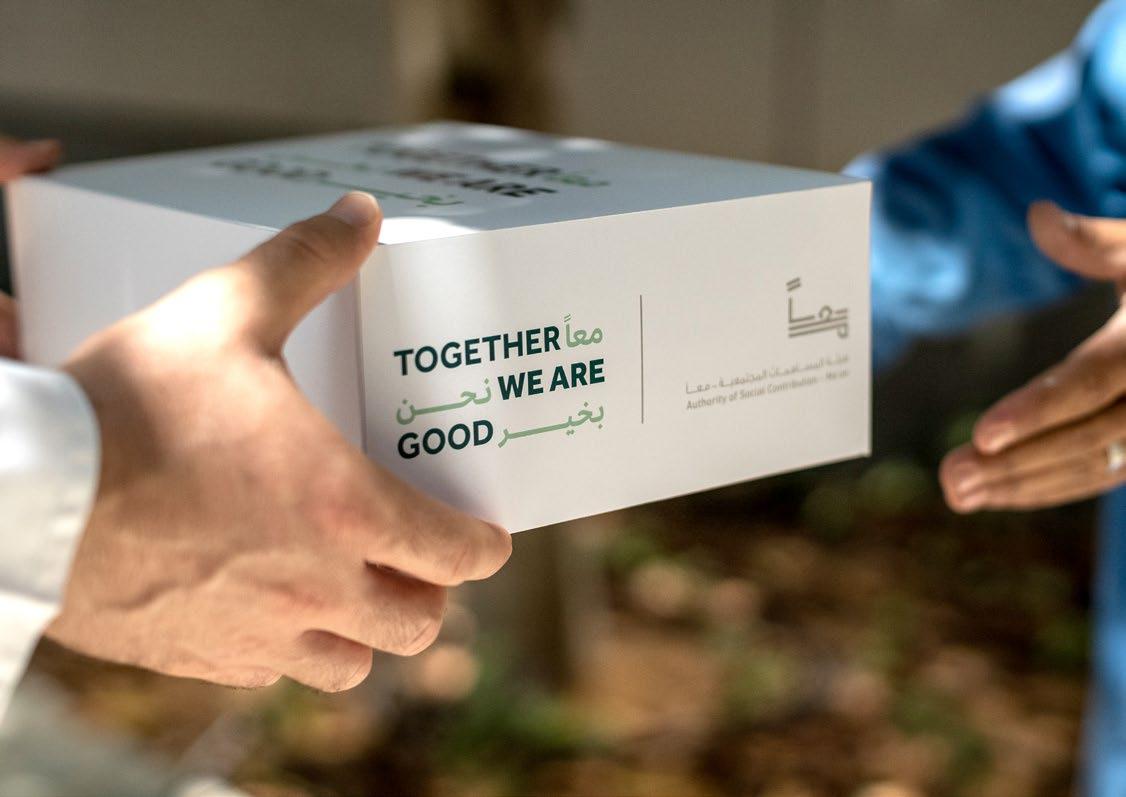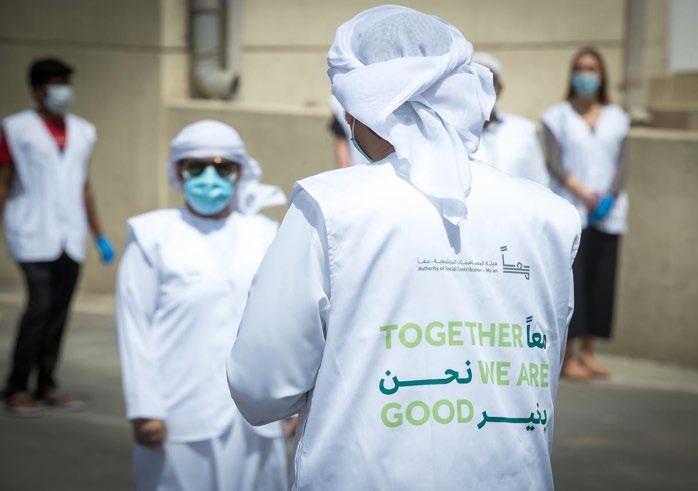
5 minute read
5. Looking Forward
Looking Forward
As an organization, Ma’an is focused on developing and implementing sustainable solutions to challenges facing the community. The TWAG programme was different in that it was responding to an unforeseen, rapidly evolving crisis. Ma’an’s pivotal role in addressing the crisis, and the significant success of the TWAG programme has given the agency unrivalled credibility in the community, and the ability to put together and implement support programmes even more rapidly in the future.
Advertisement
To overcome the intertwined health, social and economic impacts and to mitigate the economic downturn during any future crisis or a re-emergence of the coronavirus, it is essential to invest in the welfare and resilience of the community, especially the most vulnerable. This is especially true for diverse communities with a large expatriate population like Abu Dhabi.
According to the World Health Organization, the COVID-19 pandemic is far from over; the threat of its resurgence will remain for the next 12 to 18 months at least. The best time to prepare for the next crisis or any resurgence of COVID-19 is now. A return to containment measures, combined with the risk of further volatility in oil prices, will increase pressure on emergency relief. Ma’an emergency relief efforts are still needed and, as such, there is a need to build on the momentum and lessons learned. The achievements of the TWAG programme mirror the community’s responsiveness and resilience to rapidly changing circumstances. Ma’an is now firmly focused on implementing sustainable solutions with a social impact to a range of challenges faced by the communities in Abu Dhabi. Looking ahead, there are several critical considerations that would strengthen Ma’an’s emergency preparedness efforts. These considerations are built on lessons learned from the past crisis; in essence, once an outbreak is under control, governments and donors tend to turn their attention to other more immediate and pressing concerns. The main challenge is how to break the cycle of “panic-then-forget”, which has prevented the development of effective emergency preparedness in many countries.7
Some key considerations for the future:
1How to invest in preparedness with an “allof-government and all-of-society approach”
To better plan for the next crisis through an innovative and sustainable funding model, including those that utilize permanent endowments. This will require a proactive approach by establishing sustainable and versatile means and tools to fund unforeseen national emergencies, such as crisis funds, that can provide immediate and ready funding of critical resources needed for rapid crisis response. These crisis funds could be funded over time (and replenished as needed) through a combination of private and public funds.
7 World Health Organization, The best time to prevent the next pandemic is now: countries join voices for better emergency preparedness. 1 October 2020.
2How best to shape the philanthropy ecosystem in the Emirate to ensure future 3 efforts are aligned in a way to maximize efficiencies
How to build more effective and strategic partnerships and consolidate Ma’an’s mandate and efforts
The pandemic has demonstrated that the philanthropic sector in Abu Dhabi can quickly respond to the crisis. The challenge now is to expand and institutionalize the practices that emerged during the crisis for the work that lies ahead. This requires an evaluation of encountered challenges and potential improvement opportunities to maximize efficiencies and impact. Key enablers include rethinking and strengthening the existing operating model; governance; institutional set-up; laws and regulations; policies; advocacy and communication; performance system; and metrics for the various components of the ecosystem. This requires efforts to partner with private donors to go “further faster” and achieve more systemic impact and facilitate coordination across the various stakeholders in the Emirate. Concerted efforts will be needed to pool resources, align goals and priorities, share data, information, resources and deploy funds quickly through close collaboration to achieve the highest impact on the community in terms of scaling funds and interventions, shared resources, expertise and networks. What matters most is establishing transparency and accountability for private donors in terms of how funds are raised and disbursed, how results are achieved, and impact is measured. However, such partnerships can be challenging to create, manage and sustain.
4How to engage, manage and expand the private sector’s contribution in the long 5 term How to shift from the emergency response to a more strategic approach
This will require concerted efforts to engage the private sector systematically in the strategic planning process, areas of philanthropic focus, development and implementation of programmes, advocacy and communication. Most importantly, it is to create alignment and interlinkages with the private sector’s various initiatives and corporate social responsibility agendas. That supports a more sustainable operating model that is flexible enough to adapt – and yet agile enough to quickly respond to any future crisis, regardless of the type, nature and scale of the crisis. This will require a comprehensive roadmap on how funds’ planning and disbursement can be conceived and split for crisis response as well as for sustainable efforts, and focus on achieving social change with higher impact. A shift is also needed to measure short-term results (number of meals and food baskets distributed) to be complemented with longer-term outcomes (impact on social vulnerability, cohesion and livelihoods).
6How to grow the volunteer base and ensure it remains ready and engaged
A good volunteer base is considered the cornerstone for leveraging community engagement. As such, it requires the development of a comprehensive strategic approach to planning volunteer programmes that defines the skills and talent needed to contribute best to Ma’an’s mission; determines the types of volunteers; and describes the mechanisms to best attract, train, develop, manage, grow and retain the volunteer base over time. The most challenging part is to identify resources to support the volunteer programme, determine what volunteers will do and how they will work and integrate with existing staff.
Ma’an is currently working on expanding the various channels of contribution, which will make it easier for members of the community to contribute to the social fund and/or specific projects in the future. In addition, it is expanding its partnerships with public and private sector entities. This will broaden its reach (through collaborative approaches) on both the fundraising front and capital deployment in social projects, programmes and causes.
Disclaimer
Methodology constraints and limitations: As with any research and comparative analysis relating to the international crisis, analyzing funds poses several challenges and limitations. This report’s analysis and findings relied solely on the data published online by the entities leading the relief efforts across the various cases selected for the benchmark as of December 20, 2020.
About World Business Times (WBT)
WBT is a global communications company providing business research and analysis, country and industry reports, and strategic communications and marketing. WBT bridges the information gap between organizations, governments and decision-makers, providing readers with fresh insights and unique perspectives. Find out more by visiting: https://world-businesstimes.com
WORLD BUSINESS TIMES
P.O. Box 27363, Dubai, UAE +971 4 259 8555 info@world-businesstimes.com www.world-businesstimes.com
WBTMedia
wbt_media
World Business Times Ltd
WBTMedia





